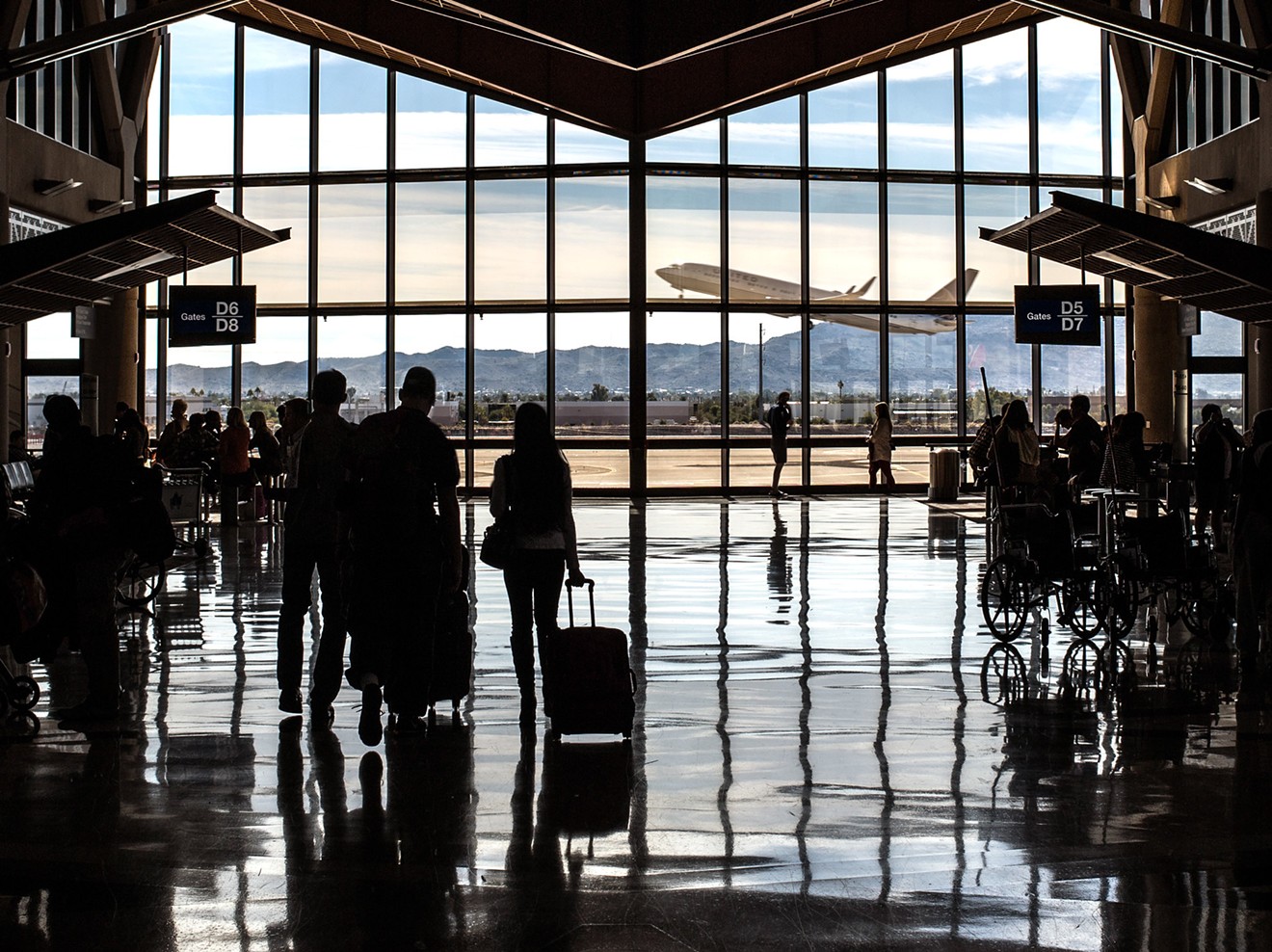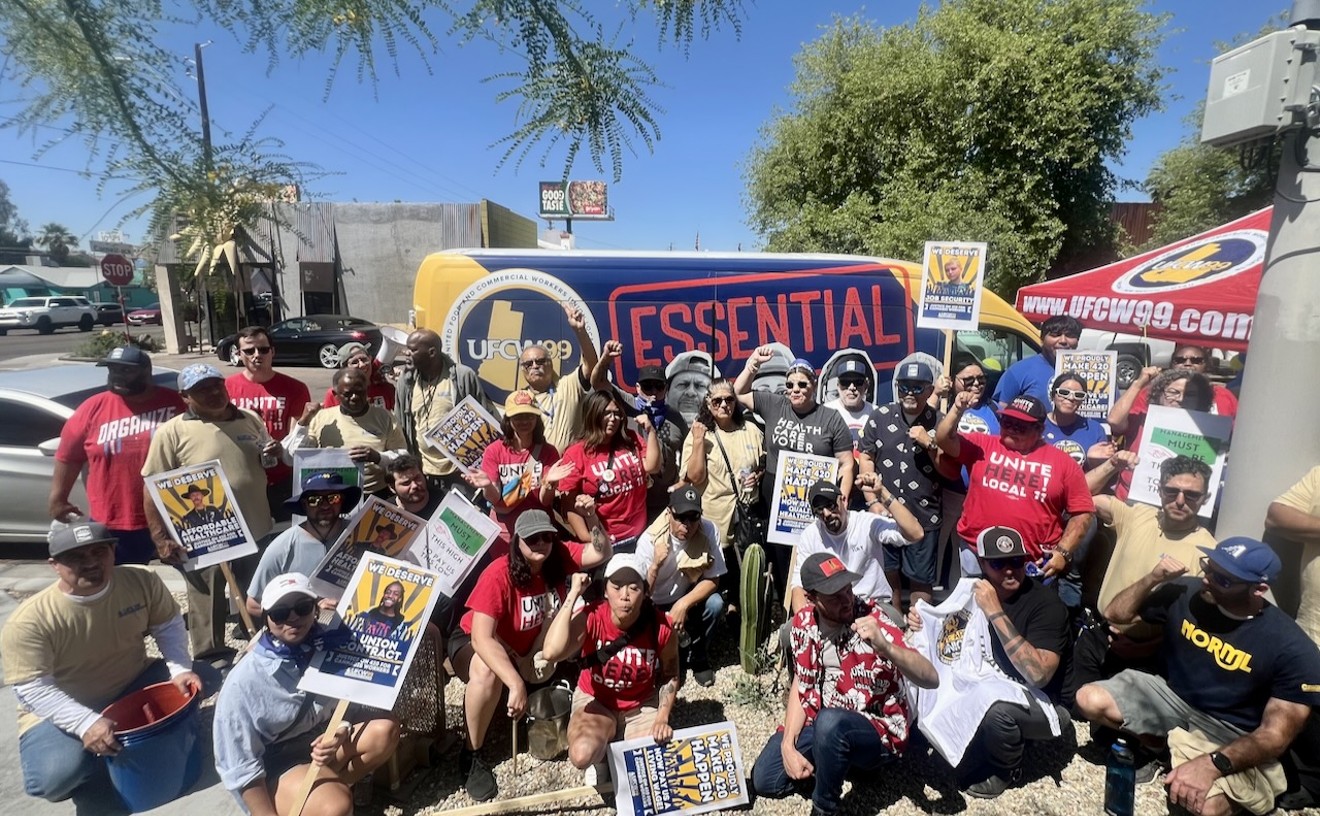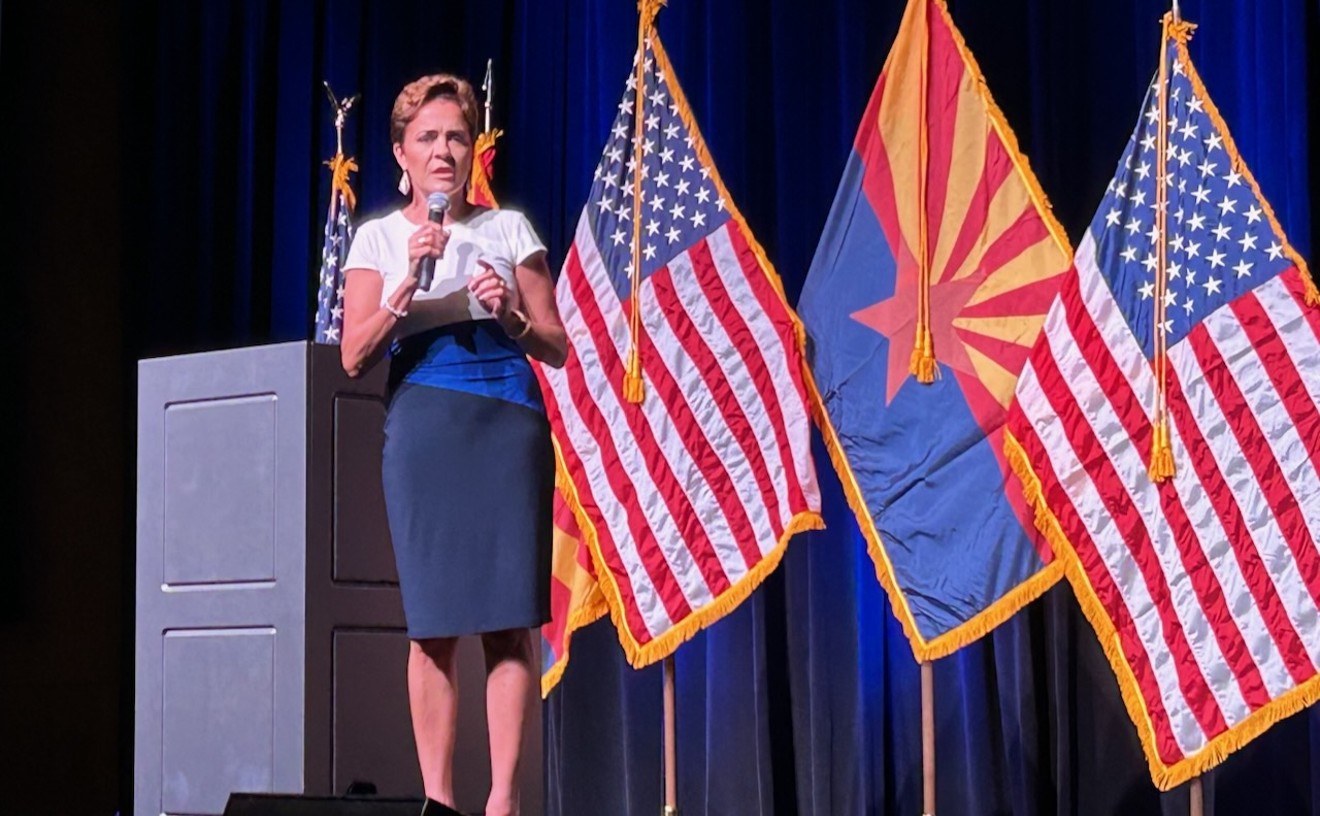Lyft made a splash in November when it threatened to cease operations at Phoenix Sky Harbor International Airport over a proposed rate hike for airport pickups and drop-offs.
Since then, the backlash against the proposed $4 curbside fee for Uber and Lyft has ballooned into something of a cause célèbre for conservative big-hitters like the libertarian Goldwater Institute, which has all but threatened a lawsuit if the plan goes through. Republican State Representative Nancy Barto, meanwhile, has promised to seek a state Attorney General's investigation of whether the ride-share fee could violate an Arizona law banning new taxes on services.
Expect the showdown to intensify in the coming weeks. On December 18, the Phoenix City Council will vote on whether to bump airport fees for Uber and Lyft from $2.66 per ride to $4 in 2020.
So, while you're panicking over the prospect of a Lyft-less airport commute and debating whether Uber is evil enough to forgo the convenience of ride-share, you might be wondering: What exactly is the City Council planning to do here? What's with these fees in the first place? And how exactly does a modest rate hike for the two biggest ride-share companies in the world devolve into a power struggle between Arizona's largest city and the state's conservative establishment? We'll answer those questions and more below.
What's in the airport transit proposal?
Believe it or not, it's not all about Uber and Lyft. The council will vote on several changes to airport transit policy. Two of those changes are relatively uncontroversial: the removal of a cap on how much Sky Harbor can charge for parking, and increased penalties for unattended vehicles.
The part of the ordinance causing the ruckus is a new fee schedule for vehicles picking up and dropping off travelers at Sky Harbor. Companies like Uber and Lyft would face a new fee of $4 per ride at the airport beginning in 2020, with incremental increases each year to $5 in 2024. From 2025 forward, the fee would be tied to inflation.
That's up from the current rate of $2.66. Taxis, meanwhile, would pay $1.75 per ride. What accounts for that huge gap, according to airport officials, is the fact that ride-share drivers cause more traffic, use more curb space, require more airport resources, including staff, and necessitate special technology. Taxi companies, meanwhile, face far more regulations than ride-share companies, including caps on how much they can charge riders and a prohibition from passing curbside fees onto customers.
Wait, what's this fee for?
To understand why Sky Harbor charges commercial vehicles to pick up and drop off customers, it's best to have a cursory understanding of the airport's finances. Sky Harbor is owned and operated by the city of Phoenix, but its budget does not come from the general fund.
Rather, Sky Harbor gets revenue from stores and restaurants inside the airport, rental car companies, parking, and yes, vehicle fees. So every time you buy Cactus Candy as a last-minute gift, you're helping Sky Harbor keep its lights on. For big projects like the Sky Train transit system, the airport leans heavily on bonds.
Now, for the drop-off and pickup fees. Think of those charges like rent. Sky Harbor has limited curb space, which it divvies up to taxis, shuttle companies, buses, and ride-share companies. Companies pay fees for the privilege of using that curb space.
Currently, airport officials say, taxis and ride-share companies are only covering about $9 million of the $26 million needed to maintain and operate Sky Harbor's ground transportation system. Most of the revenue generated from the new fees — about $18 million annually — would go toward maintaining and operating the Sky Train. A smaller portion of the fee would pay for the airport's roads and other necessities like signage and traffic controllers.
What's the backstory?
The controversy over the planned fees for Uber and Lyft is part of a bigger story about how ride-share companies have upended ground transportation at Sky Harbor and an even bigger story about the recent bruising these companies have faced in financial markets and large cities. Before 2015, cabs ran the show. One or two taxi companies had to bid for the right to access the airport's curbside pickup and drop-off zones and would pay a fixed fee for the privilege.
Those companies had to follow some pretty stringent regulations. On top of the rules listed above, like maximum ride charges, taxi companies also had adhere to rules regarding the minimum number of vehicles present at all times (even super-slow hours), the age of cars, Americans with Disabilities Act accommodations, and other requirements.
Around 2015, more and more Uber and Lyft drivers started dropping off travelers at the airport. Taxi drivers became upset because most of their new competitors were inexperienced and did not have to follow the same standards imposed on them. In response, city officials reworked the model for Sky Harbor ground transportation to include ride-share companies.
Instead of fixed-rates for curbside rights, the city negotiated per-ride fees for pickups. The attempt to regulate Uber and Lyft at the airport in 2015 also sparked a conservative backlash. But back then, the main point of controversy was not the fee, but a requirement for Uber and Lyft drivers to undergo the same fingerprinting process required of taxi drivers. Republican Governor Doug Ducey notably criticized Phoenix for regulating ride-share at the airport. The city eventually dropped the fingerprinting requirement in 2016 and allowed Uber and Lyft to conduct their own background checks.
Why is Phoenix trying to raise curbside rates now, and how did city officials decide on the rates?
When city officials came up with the model for ride-share at the airport, they also committed to doing a study after a couple of years on how the program was working. That study, completed this summer, found that Phoenix lagged behind other big cities that covered more of their infrastructure costs through ground transportation fees. In addition, the study found that more cities charged for pickup and drop-off, while Phoenix only charged for pickup.
So city officials got stakeholders together, including ride-share and taxi companies, to negotiate new fees to better cover infrastructure costs. The city's three-member Aviation Advisory Board acted as an intermediary between the transportation businesses and Sky Harbor. Uber and Lyft got some concessions, including promises of additional curb space, branded signage, and improved GPS technology. But Sky Harbor refused to budge on a request to ban any future increases to the fee after it reaches $5, among other asks from the ride-share companies.
After Sky Harbor unveiled its proposed fees, Uber and Lyft both announced their opposition.
What's with Lyft's threat to end service at Sky Harbor?
It should come as no surprise that Lyft is playing the "don't make me walk out the door" card. Both Uber and Lyft have threatened to pull out or have stopped service in cities and airports to protest new regulations. Among the places this has happened: Austin, Texas; Houston; Ontario, California; Quebec; Barcelona; and more. In cases where the companies leave, they usually come back.
It seems unlikely that Lyft would permanently leave Sky Harbor and concede all the rides there to Uber, which has not threatened to stop service at the Phoenix airport. Keep in mind that Uber and Lyft are both unprofitable companies that went public this year with disappointing results.
Neither of these businesses are particularly well situated to give up business. On top of their stock market woes, both companies, but particularly Uber, have faced a bunch of negative publicity for ethical issues. Cities have cracked down on bad business practices.
So, what's going to happen?
Bet on the proposal to pass on December 18. Council members already voted seven-to-two to approve the raised rates in October, but have to vote again due to a technicality. As of now, none of the council members who voted for the rate have publicly shown a change of heart.
What happens after the increased fees pass is another question. The Goldwater Institute has hinted that it could file a legal challenge to the rate, claiming that it violates a voter-approved constitutional amendment that banned new taxes on services. So even if the $4 fee goes through, it could be held up in the courts.
Adopting the Goldwater Institute's position, Representative Barto said on December 5 that she would file a complaint with the AG's Office if the council passes the fee. Under Arizona law, if AG Mark Brnovich determines that the ordinance is illegal, the state government could withhold funds from the city of Phoenix.
[
{
"name": "Air - MediumRectangle - Inline Content - Mobile Display Size",
"component": "18478561",
"insertPoint": "2",
"requiredCountToDisplay": "2"
},{
"name": "Editor Picks",
"component": "16759093",
"insertPoint": "4",
"requiredCountToDisplay": "1"
},{
"name": "Inline Links",
"component": "17980324",
"insertPoint": "8th",
"startingPoint": 8,
"requiredCountToDisplay": "7",
"maxInsertions": 25
},{
"name": "Air - MediumRectangle - Combo - Inline Content",
"component": "16759092",
"insertPoint": "8th",
"startingPoint": 8,
"requiredCountToDisplay": "7",
"maxInsertions": 25
},{
"name": "Inline Links",
"component": "17980324",
"insertPoint": "8th",
"startingPoint": 12,
"requiredCountToDisplay": "11",
"maxInsertions": 24
},{
"name": "Air - Leaderboard Tower - Combo - Inline Content",
"component": "16759094",
"insertPoint": "8th",
"startingPoint": 12,
"requiredCountToDisplay": "11",
"maxInsertions": 24
}
]











